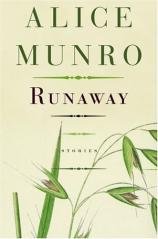Runaway: Stories
Review
Runaway: Stories
I have been learning to knit lately, and I'm still at the stage where each stitch is awkward and laborious. Watching my friend and teacher do it is quite different --- smooth and rhythmic, neither too much tension nor too little. I see that knitting is a mysterious architecture of wool and soul in which every loop and turn depends on every other, and with a single missed link the whole web can collapse.
Reading the Canadian writer Alice Munro is similar to this. Her stories are woven with such craft that it seems almost as if she is describing something that really happened rather than inventing it. And the consequences of a lucky encounter or a fateful decision are still playing out years later.
I must admit that I was intimidated by the prospect of reviewing Munro's latest collection, RUNAWAY, named one of the 10 Best Books of 2004 by the New York Times. She is probably my favorite living writer, and so unpretentious about what she does that the last thing I want is to describe her fiction in words fancier or more self-conscious (in one review, I found adumbrate, transformative, sustenance, and salvation) than the language she uses herself.
I'm not alone in feeling perplexed. Jonathan Franzen, writing in the New York Times Book Review (November 14, 2004), was so reluctant to do an ordinary review of this extraordinary writer that instead he produced a (brilliant) list of "guesses at why [Munro's] excellence so dismayingly exceeds her fame." And it's true: She is revered rather than celebrated --- no Pulitzer, no Nobel, not even a National Book Award (though she has won plenty of other prizes). Possibly (Franzen mentions this) it has to do with literary form: Short stories (Munro has written only one novel) have not been --- since the days of Chekhov (with whom she is regularly compared) and Saki, Katherine Mansfield and O'Henry --- as valued as much as novels. They're just not considered Big-Deal Lit.
But I am procrastinating. Without giving away the often devastating twists and surprises of the plots of these eight stories (if literary fiction isn't supposed to be suspenseful, somebody forgot to tell Munro), this is what I'd say to somebody who has never read her (if you have, you probably already have your own copy of RUNAWAY).
The first thing is the characters: I wouldn't say they are memorable in the sense that Emma Bovary or Anna Karenina are, but unlike either of those fictional ladies, they are endearingly ordinary: They don't swan around being melodramatic or heroic or incurably romantic. They are often smart, ardent girls, different from others at school, hungry for books and adventure and mystery --- like Grace in "Passion," one of my favorites in the collection. Here, Munro has crystallized the stuff of many a coming-of-age novel --- the innocence and fakery, the fear and the splendor --- into one powerful memory of a seductive family and a reckless ride. This is Munro's gift: She gathers us in with ordinary details, and a whole world opens up.
The second thing is the place: not just Canada, but a patch of western Ontario. Munro roots almost all her stories in this area a few hours from Toronto, where she grew up and now lives. "I am intoxicated by this particular landscape," she has said, and she seeds it with city people transplanted to the country (like Carla and her husband with their horse farm in the title story, "Runaway") or country people learning urban ways. There is always a tension between these two, and between other recurrent oppositions as well --- marriage and solitude, survival and suicide, faith and apostasy. Duality runs through her work like a bright thread.
The third thing that is so compelling about RUNAWAY is a powerful sense of fate, chance, destiny --- the exact word is unimportant. Frequently the structure of the stories works in a circle; you can't understand the beginning of "Trespasses" until you have read the end. Or, as in the case of the trio of interlinked stories about a woman named Juliet, you don't understand the implications of an accidental meeting in "Chance" and a fairly uneventful visit to aging parents in "Soon" until you read the third story, "Silence." These tales aren't just chronologically and thematically connected; what Munro does is more like planting time bombs in the narrative that will explode later on, when you least expect them.
This quality is even stronger in "Tricks." Robin, a nurse who lives near Stratford, Ontario, goes to see a Shakespeare play (until then, her only passion) and encounters --- yes, by accident --- Danilo, a man from Montenegro. They agree that they will meet again a year later. What happens then is a life --- and we follow Robin until she is in her sixties --- that has the arc and heartbreak and curious detachment of genuine tragedy. "Tricks" is so bold, so horrifying and at the same time so satisfying that I lived with it for days afterward.
Even though these stories are often piercingly sad, they aren't depressing. There is a wonderful strength and survivorship in the girls and women of RUNAWAY. In "Chance" Munro writes of Juliet's love of Greek (her degree is in Classics) as her "bright treasure"; in "Tricks," similarly, of Robin's anticipation of her next meeting with Danilo: "She was aware of a shine on herself, on her body, on her voice and all her doings." And in "Passion" Grace is told by her fiancé's mother, "Women always have got something, haven't they, to keep them going? That men haven't got."
RUNAWAY feels intimate and universal at the same time --- as if the author is whispering in your ear and seeing into your heart and laying bare your secrets. Perhaps that's because Munro herself has spoken of the extreme vulnerability of the "thinly clothed" writer who has only "the thing you're working on now." Her stories dig under the fences of writer and reader, and it is both disturbing and glorious.
Reviewed by Kathy Weissman on January 23, 2011
Runaway: Stories
- Publication Date: October 26, 2004
- Genres: Fiction, Short Stories
- Hardcover: 352 pages
- Publisher: Alfred A. Knopf
- ISBN-10: 140004281X
- ISBN-13: 9781400042814




